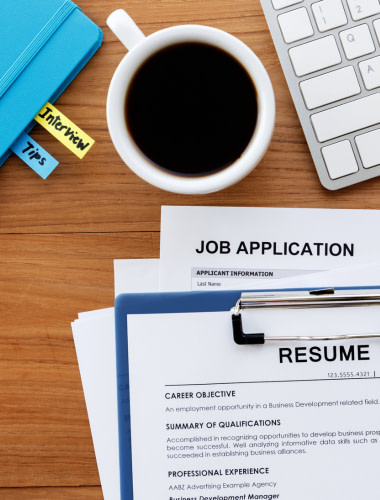This article is recommended for mature-age candidates

The challenges of being an older candidate
Having spent many years in recruitment, I understand the concerns that many have when trying to find a job as a mature age worker. It's not uncommon to worry about facing prejudice based on your age. There's a fear that employers might perceive you as less adaptable or capable due to your years of experience.
Although the Age Discrimination Act 2004 (ADA) is in place to prevent age-related discrimination during the hiring process, discriminatory behaviour can still exist in more subtle ways. Identifying and eliminating it can be challenging, as some employers might overlook mature-age workers simply because they believe they won't "fit in" with their younger employees.
For those who have decided to change careers later in life or are re-entering the workforce after a break, finding a suitable position might feel overwhelming. It's hard to know where to start or how to present yourself in the best light.
But it's essential to remember that as an older worker, you have a unique set of skills and experiences that you bring to the table. Many of these skills take years to develop, and the wealth of experiences you've gained throughout your life is invaluable. Instead of viewing age as a limitation, you should recognise the value it adds to your capabilities as an employee.
In this article, I aim to provide useful tips and strategies to help overcome some of the challenges that mature-age candidates might encounter during their job search. It's important to highlight your strengths and showcase the qualities that make you an exceptional candidate. By doing so, you can increase our chances of finding fulfilling and meaningful opportunities that appreciate the wealth of knowledge and expertise you have to offer.

Upskill yourself
In today's fast-paced world, staying ahead in your career requires continuous professional development and training. It involves not only advancing your existing skills to remain relevant in your industry but also acquiring new ones and filling any knowledge gaps that may exist.
I often advise mature-age workers to prioritise ongoing upskilling, especially in fields where change and evolution, such as technology, are constant. Embracing this process ensures that you remain competitive and adaptable in the ever-evolving job market.
Additionally, it's key to identify the skills you currently possess, including any transferable skills that might be applicable in other areas. Recognising your skills and understanding how they can be applied in different contexts can open up new career opportunities.

But where do you start?
Firstly, I always advise job seekers, to start by identifying the skills they need to work on based on what will benefit them the most in their job hunt. It can be overwhelming to know where to begin, but there are some great tools available in Australia to help with this.
One tool is the JobOutlook Explore Australia tool, which allows you to discover how the job market is evolving in your area. It provides the projected employment growth for top jobs and highlights the in-demand skills. Paying attention to this is crucial for upskilling, especially if you're looking to switch jobs within the same industry.
Another valuable resource that can help you find a job as a mature age worker is the JobOutlook Future Outlook tool. This tool not only showcases the current job opportunities but also looks into the future to define the skills needed for the jobs you're interested in. For someone who might be considering a career change or re-entering the workforce after a break, this tool is ideal.
In Australia, there are multiple options for training and courses. MySkills and CourseSeeker websites are great places to find local training options. These websites provide comprehensive information about available training programs, including estimated costs and timeframes.
However, registered training isn't the only option. For those who prefer to learn while they earn, I recommend considering part-time, casual, contract, or temporary work opportunities. These roles can be a great way to keep your skills up to date while you continue your job search.
Additionally, there are other ways to upskill that may not involve formal training. Offering coaching, mentoring, tutoring, or consulting services are excellent avenues to share your expertise and continue learning. Volunteering is also a valuable option that allows you to contribute to the community while gaining new experiences and skills.

Update your CV
As someone who has been working in recruitment for a long time, I can't stress enough how crucial it is for mature-age workers to keep their CVs up-to-date.
Whether you're currently employed or not, regularly adding your professional achievements and duties to your CV is essential. This ensures that when you decide to apply for new opportunities, you won't have to start from scratch, and your accomplishments will be fresh and relevant. This will make it far less daunting to find a job as a mature age worker.
If it has been years since you last updated your CV, it can be daunting to know where to begin. My advice would be to focus on the last 10-15 years of your employment history. However, this rule isn't set in stone; if you've taken a career break or your most recent work experience was quite some time ago, do include it. The same applies to any significant achievements that occurred more than 15 years ago.
To make your CV age-neutral, consider removing dates wherever possible. You don't need to include dates for degrees, certifications, or training unless they are essential for a particular role. Keep in mind that certain certifications may have expiration dates, so only include those that are still valid.
If you engaged in upskilling during career breaks, include that in your CV. Upskilling is not just formal registered training. Highlighting your commitment to self-improvement can demonstrate your willingness to adapt to new challenges.
When crafting your CV, include both direct and transferable skills. Showcase the expertise you've gained from your previous roles and emphasise how these skills can be valuable in the position you're applying for.
Address any gaps in your employment history in your cover letter. Be honest about the reasons and use the opportunity to highlight any personal or professional growth you experienced during those periods.

Be flexible
Throughout my extensive career in recruitment, one valuable lesson I've learned is the paramount importance of adaptability, especially when considering a career change. This principle holds even truer for mature-age workers who may find themselves needing to embrace a lower-level position than their previous role.
Hence, the third tip I offer to job seekers is to embrace flexibility and showcase this trait to potential employers. It is essential to demonstrate a genuine willingness to adapt to a new role and an enthusiastic eagerness to acquire new skills. As an experienced candidate, I understand the significance of referencing any relevant upskilling endeavors undertaken to provide concrete evidence of this commitment.
Having assisted numerous candidates throughout the years, I know that demonstrating flexibility is a key factor that can set an individual apart from other applicants. Employers value adaptable employees who are open to learning and growing within their organisation.
If you are eager to learn more about how to effectively exhibit flexibility to prospective employers, I encourage you to click the button below to access a comprehensive step-by-step guide. I have seen firsthand how following these strategies has led to successful career transitions for many candidates, and I am confident it can make a significant difference for you as well.

Prepare for your interviews
While it's essential to adhere to laws against age discrimination, we must also be vigilant about subtle age-related inquiries.
Throughout my experience, I've encountered various common interview questions from employers, and I've learned how to navigate them, drawing from insights shared by Top Resume.
One such question that often arises is, "How do you feel about working for a manager younger than you?" As a mature-age worker, it's not uncommon to have had younger managers in the past. When faced with this question, I always advocate for honesty and respect in the response. For example, "I emphasise the ability to work hard, follow instructions, and remain open-minded, regardless of the age or position of the supervisor".
Another tricky question is, "Why are you leaving your current role?" It's crucial not to speak negatively about the previous workplace. Instead, if the reason is redundancy, I advise being forthright with the interviewer about it while focusing on the positive contributions made in the last role and how those skills can be brought to the new opportunity.
When asked about the greatest professional achievement, I encourage tailoring the response to something relevant to the job being applied for. This might be more challenging when switching industries or roles, but it's essential to align the achievement with the key selection criteria outlined in the job description. For instance, if it's a customer service-based role and you have limited experience, you could discuss how you maintained strong relationships with colleagues or suppliers to improve overall company efficiency in your previous position.


Are you looking for a job?
Now that you know how to find a job as a mature age worker, you should take a moment to check our current vacancies page.
At 11 Recruitment, we have a range of white-collar temp and perm jobs available. We're always on the lookout for top talent to place with our clients, so we encourage you to apply for any positions that are of interest.
If none of our current vacancies are right for you, you should register for job alerts. Then we’ll be able to notify you when we receive a position that matches your profile.

What are your thoughts?
I'd love to have a conversation with you about this topic - please leave a comment below if you have any thoughts or opinions 🙂
Christian Madsen
Managing Director of 11 Recruitment





















Christian, totally uplifting and informative, thank you for all your insights and advice. Very much appreciated.
You’re most welcome, Deborah. I’m so glad you enjoyed the article 🙂
Some pithy stuff here Christian and worthy of serious attention. I suspect the going will be easier once I return physically to Australia…very difficult since Covid to interact with any organization (especially government) from outside the country. The barriers went up!
Hi St-John, thanks for taking the time to leave a comment! I’m glad to hear you found the article useful.
I agree that it will likely be easier for you to find a job when you’re back in Australia. In my experience, various factors discourage organisations from hiring candidates outside the country. While not all of these factors will be relevant to you (since you state you are “returning” to Australia) they may still contribute to why an organisation does not consider international hires.
1) Being physically distant from Australia can create communication barriers. Employers might prefer candidates who can attend interviews in person or have real-time communication during the hiring process. Time zone differences can also complicate scheduling.
2) Employers typically need to sponsor work visas for international employees. This process can be time-consuming, costly, and involve legal requirements. Employers might be more inclined to hire locally to avoid these complexities.
3) Australia has its own pool of job seekers, and employers may prefer candidates who are already in the country. They might want to avoid potential delays associated with hiring someone from abroad.
4) Employers might prioritise candidates who have experience working within the local culture and market. Having local knowledge and understanding of industry practices can be important for success in the role.
5) Moving to a new country involves logistical challenges, such as finding accommodation, understanding the local cost of living, and adjusting to a new environment. Employers may worry about candidates being unprepared for these adjustments.
6) The job market can be competitive, and employers might feel more confident in hiring candidates they can interview in person and evaluate more thoroughly.
7) While English is widely spoken in Australia, there might still be differences in communication style and language proficiency that employers consider when hiring from abroad.
8) Many jobs are filled through personal connections and networking. Being physically present in the country can give you more opportunities to attend industry events, meet potential employers, and make connections.
COVID-19 made it even harder for employers to recruit internationally, as the borders were closed for quite some time. At present, the housing crisis is adding another barrier to international hires, as finding accommodation for those who relocate is a concern.
Currently, I find that organisations are typically only willing to hire international talent when there’s a skills shortage within their industry and they are unable to source suitable candidates from within Australia as a result.
If you do wish to apply for any vacancies in Australia before you move back here, I would encourage you to directly address your situation in your cover letter and emphasise that you have lived in Australia previously and will be returning soon.
For example, you may want to include a statement similar to the following:
“After spending [Amount of Time] in [Current Country], I am eager to return to Australia and immerse myself in its dynamic professional landscape once again. Having previously lived in Australia, I am well-acquainted with its unique work culture, industry trends, and the exceptional opportunities it offers.”
“I am committed to ensuring a seamless transition back to Australia and firmly believe that securing a job prior to my arrival will enable me to hit the ground running. By proactively seeking out opportunities and aligning myself with forward-thinking companies like [Company Name], I aim to not only contribute my skills and experience but also be a valuable asset from day one.”
I hope you find this helpful and I wish you all the best in your job search 🙂
Thank you Christian, I did get some very helpful advice from this.
Hi Allan, thanks for your comment! I’m glad you found it useful 🙂
Many thanks for practical advice for all those pursuing new challenges in their professional career.
Hi Tint, you’re most welcome! Thank you for your comment – it’s great to hear you found the article valuable 🙂
Great tips here, ageism is alive and kicking despite mature age workers being hard working and dependable employees. It’s always helpful to know a few extra ways to help you ace that interview.
Hi Helen, thanks so much for your comment. I’m glad you found the article helpful 🙂